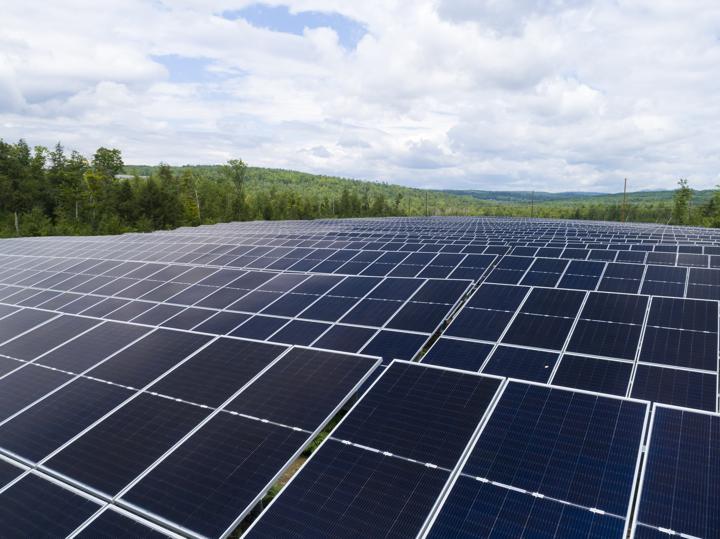
Working Together
Launched in 2018, the New England College (NEC) Renewable Partnership is a first-of-its-kind collaboration among Amherst, Bowdoin, Hampshire, Smith, and Williams. Each of the colleges is purchasing zero-carbon electricity from the Farmington facility to reduce carbon emissions from campus electricity use. The colleges partnered with Portland-based energy advisor Competitive Energy Services (CES)-including CES President and COO Andy Price ’96 and Vice President for Analytics and Operations Matt Gamache ’13- and NextEra Energy Resources on the project.
Big Reflection
The 490-acre utility-scale solar facility will create enough electricity to power about 17,000 New England homes annually, making it one of the largest solar projects in New England to date.
Powered Up
The NEC Renewable Partnership enables Bowdoin to deepen its commitment to renewable energy solutions. As part of the Farmington solar project, the College will purchase 5 percent of all renewable energy (in the form of renewable energy credits) generated by the 76.5 MW project—equivalent to 40 percent of Bowdoin’s current annual electric usage. It’s also helping each college manage costs by locking in the price of electricity for the next twenty years.
Bowdoin Sun
Since 2018, when Bowdoin achieved carbon neutrality, the College has signed agreements with various Maine solar photovoltaic (PV) facilities, including a second large solar array on College-owned property at Brunswick Landing, the former Naval Air Station in Brunswick. The first, developed in 2014 with Solar City, was at the time the state’s largest solar array and includes rooftop PV systems on Bowdoin’s major athletic facilities.
Bright Future
All projects contracted by Bowdoin are expected to be online and producing power by the end of 2023—covering 100 percent of current electric usage with Maine-based renewable energy. These efforts are laying the foundation for the College’s longer-term goal of electrifying the campus heating load and significantly reducing, if not eliminating, the use of fossil fuels on campus.
Gold Star
In late 2021, the Association for the Advancement of Sustainability in Higher Education (AASHE) recognized Bowdoin as a top performer in the “air and climate” and “public engagement” categories and included the College among institutions having earned an overall gold rating in AASHE’s 2021 Sustainable Campus Index. AASHE developed its Sustainability, Tracking, and Assessment Rating System (STARS) as a transparent, self-reporting framework for colleges and universities to measure sustainability performance.
Acting Locally
The Farmington project has had a significant impact on the local economy, creating approximately 500 temporary construction jobs and a capital expenditure of approximately $150 million. It is estimated to generate tax revenue of nearly $17 million over its thirty-year lifespan.
Original Publication: Bowdoin Magazine - Winter 2021-2022 (pg. 66)
Photo provided by Nextera Energy Resources
